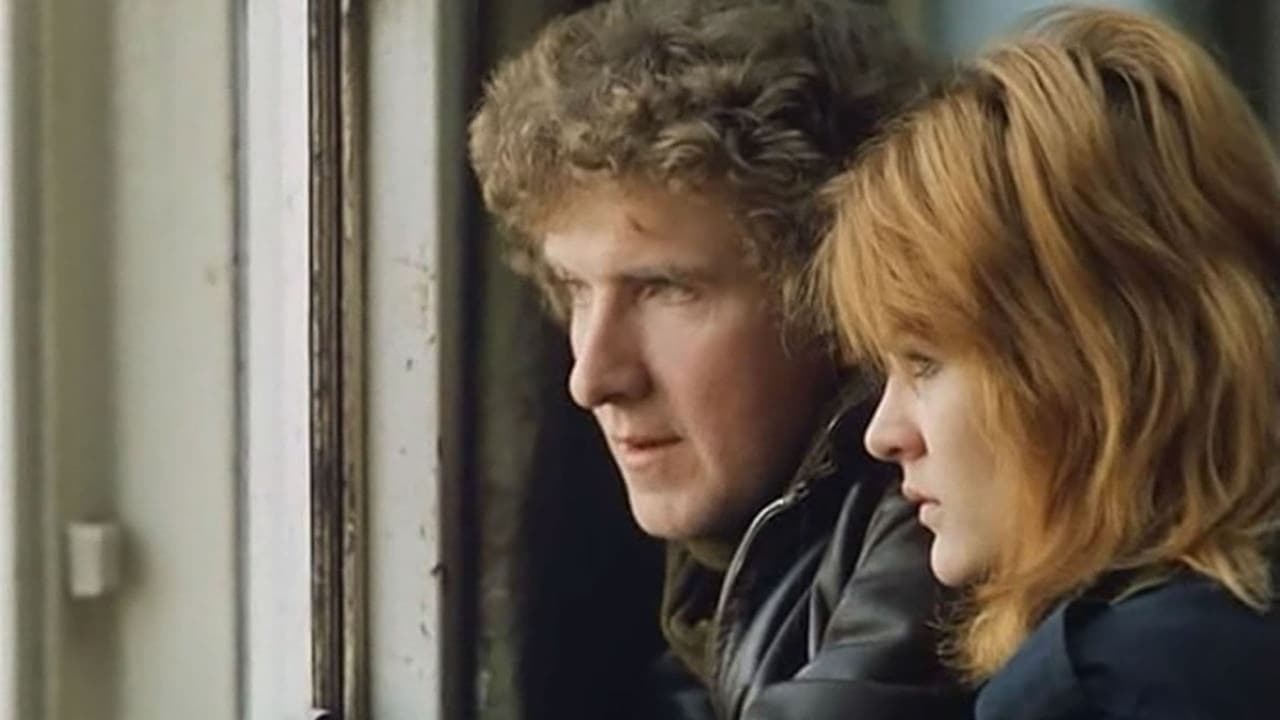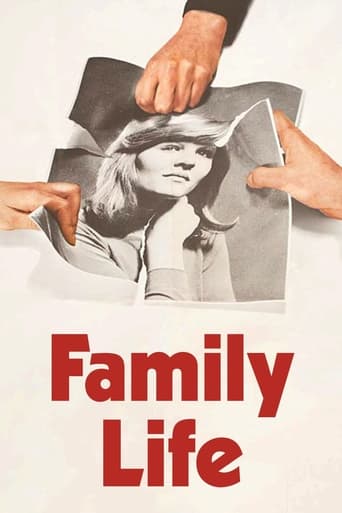Bessie Smyth
Great story, amazing characters, superb action, enthralling cinematography. Yes, this is something I am glad I spent money on.
Jakoba
True to its essence, the characters remain on the same line and manage to entertain the viewer, each highlighting their own distinctive qualities or touches.
Staci Frederick
Blistering performances.
pipsycaldwell
Sad, extremely true to life, though. Teenage girl trying to find herself while being restrained by parents who believe it's their way or the highway. No room for discussion, zero tolerance on the parents part. I could find no evidence of Schizophrenic behavior with the girl. Perhaps slightly bipolar. I felt extremely hurt by the mother's decision to make the girl abort her baby with no thought for how the girl would feel. The parents constant insistence that 'they know best' was so apparent throughout. The elder sister arguing with the parents in front of the g'children very sad but so much part of the family's everyday life.
Sindre Kaspersen
British social realist director Ken Loach's third feature film, an adaptation of the television play "In Two Minds" (1967) which was written by David Mercer (1928-1980) and directed by Ken Loach, was shot on location in Britain, and tells the story about 19-year-old Janice who has been brought up in a very strict working-class family. She lives with her mother and father who thinks she is irresponsible because she often changes jobs. Janice doesn't do what her parents want her to do and she stands up to them, so they decide that she is sick, talks her into having an abortion because they don't think she is fit to be a mother, sends her to a psychiatrist and eventually to a mental health institution.Acutely directed and with a straightforward narrative, this quietly paced and dialog-driven British independent film about social alienation and family relations touches the theme of Schizophrenia, and portrays a quiet study of character with a pointedly understated performance by Sandy Ratcliffe in her debut feature film role as a young woman who's way towards independence and self respect is obstructed by her parents, who are more interested in giving her directions and criticism rather than giving her the encouragement she needs her to live her own life. This compassionate, realistic and social documentary drama from the early 1970s, captures the failure in communication, the generational differences and the involuntary surrender of a 19-year-old woman who is being oppressed by her caretakers.Ken Loach has a take on depicting stories about individuals who are misconceived and wrongfully treated by society, and his gentle and attentive approach is commendable. As his second feature film "Kes" (1969), "Family Life" has heart, substance and relevance, and is a fine introduction to the works of one of Britain's greatest directors.
Al
Filmed in a distant documentary style presumably for realism. The film may have provided a touch of inspiration for later films such as Frances starring Jessica Lange.Sandy Ratcliff plays a disturbed young woman who fails to be understood by the authority figures represented in many ways by her surprised parents and also by the medical/psychiatric staff.The bleak conversational way in which it is filmed adds to our feeling of helplessness for Ratcliff's character which at times is as mischievous and out of control as Jessica Lange later was in her portrayal of the late Frances Farmer.
dbdumonteil
..and however,she's leaving home,at least mentally."Family life" is the most difficult,the most austere of all Kenneth Loach's efforts.One should add it's also his most dated.The generation gap,with these "boys and daughters who are beyond your command",all this looks like hippie relics.As do the mother's wailings:the youth is not what it used to be,they don't show respect anymore,they make love all day when they're not taking drugs etc.The generation gap is not typically sixties or early seventies.It's an all-time problem:For instance,Elia Kazan's "East of Eden" was made in 1954,and the action takes place circa 1914.So a lot of stuff at the beginning of "Family life" deals with clichés.Nevertheless,this movie is a must if you like the "European " style.Its form is absolutely unique,looking like a special report,a survey,with question/answer dialogues galore.At times,we wonder whether the actors are actually playing.We're close to "cinema verite" (see JL Godard's "masculin feminin" (1966))A viewer who would turn the TV on halfway through the movie,might think he's watching a documentary film.Janice is a rather normal young woman,with normal problems.she had a hard time of it when she had an abortion .Her mother is a puritan,rigid,and probably frigid woman,her father is a "honor and duty" man.Both content themselves with a routine nine-to-five life,and they are convinced that they are good parents.The father is proud of the clock his bosses have given to him,after 25 years of hard work,the mother of her jelly.Janice is some kind of misfit,and she's not unlike the main character from "la tête contre les murs"(George Franju,1958).But there's a huge difference:Franju tells a story,Loach does not.No dramatization at all in the English director's film.There is a similar scene in the two movies:both inmates escape ,take refuge in their girl/boyfriend's flat,then the police come:Franju's character is desperate,revolted,Janice is already a zombie,she cannot react anymore.A lot of people said the shrinks were caricatures in "family life":completely true as far the last one is concerned.But the first one ,on the other hand ,sees well:three times,he asks the father if his sexual relations are satisfying ,and every time he tries to change the subject.Kenneth Loach has come a long way from the documentary style of "poor cow"(1967) and "family life".It's interesting to note that the movie midway between ,"Kes" (1969),is more accessible,being more storybook.During the eighties and nineties,with such works as "hidden agenda" and the wonderful "carla's song",Kenneth Loach will prove he can be a story teller too.

